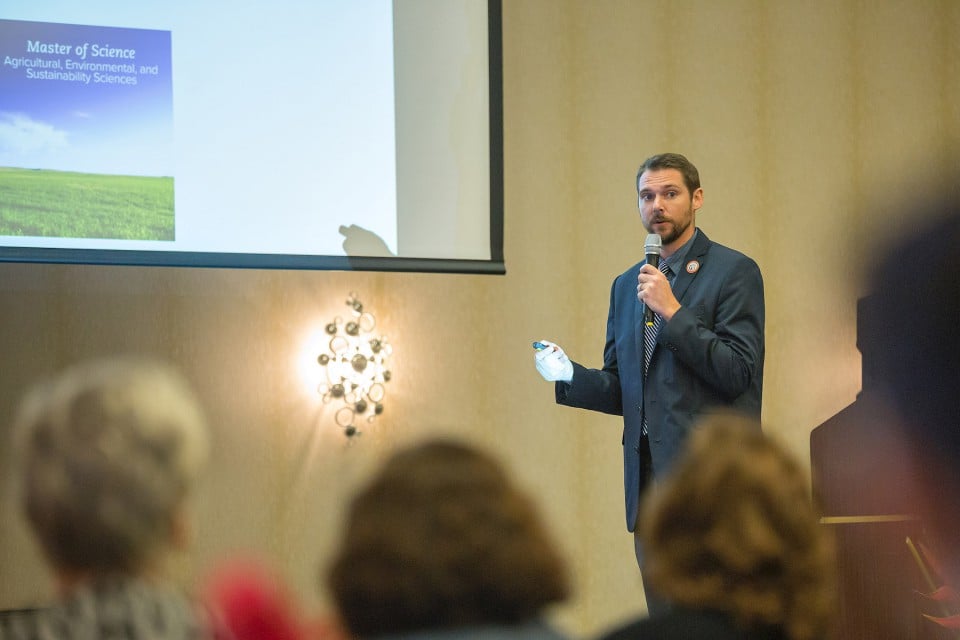By Amanda Taylor
McALLEN, TEXAS – If you were to ask someone 10 to 20 years ago what exactly sustainability was, you’d probably get more blank stares than any actual information. Although sustainability is making a slow but steady trickle into the minds of younger generations, the fact remains that sustainable concepts are steadily entering the mainstream, which includes sustainability-based learning.
To help incorporate sustainability into the minds of university faculty and community leaders, The University of Texas Rio Grande Valley has been working in partnership with the Association for Advancement of Sustainability in Higher Education (AASHE), by hosting annual two-day faculty development programs called the International Center for Sustainability Across the Curriculum (ICSAC) Conference. This year’s conference was held recently at the Embassy Suites Hotel by Hilton McAllen Convention Center.
Celebrating its fourth year, this year’s intensive conference invited international and local faculty to speak during the conference to provide a wide range of experience on the ongoing collaborations in the pursuit of a more sustainable world. The ICSAC conference grew out of a former successful project, Sin Fronteras, which encouraged faculty from all fields to exchange ideas, and help nurture a collaborative atmosphere between faculty and students.
“This is two days of intensive professional development providing pedagogy to create a learning experience that is more interdisciplinary, experiential, and focused on authentic problem-solving,” said Marianella Franklin, chief sustainability officer in the UTRGV Division of Finance and Administration. “One of the main focuses is interdisciplinary learning. The principles of sustainable curriculum include ways to positively impact the three main systems we live in — economic, social and environmental systems.”
To help instructors design a plan that will successfully incorporate sustainability without abandoning disciplinary expertise, the workshop allows participants to develop a transdisciplinary framework sustainably relevant to their discipline and uses hands-on processes to help redesign existing syllabi to accommodate sustainability practices.
“After the course, professors submit syllabi and learning objective plans on how they want to initiate sustainability within the course,” Franklin said. “Then, we meet with them and go over how we can assist them with resources.”
Franklin and her team work with departments such as the B3 Institute and the UTRGV Office of Global Engagement to provide the tools faculty need to expand their curriculum and help spur community engagement.
Guest speakers, which included several UTRGV faculty members, Pharr-San Juan-Alamo ISD representatives, City of Pharr officials, and other experts, were invited to the conference to demonstrate how their methods of sustainability teaching has worked, or discuss future plans and projects to help students grasp sustainability concepts.
As years pass and sustainability becomes a growing concern, Franklin hopes the ICSAC conference can become more immersive, seeing more faculty from neighboring institutions.
“We are hoping the conference expands to something greater,” she said. “Right now, we have it structured to be an intensive two-day workshop, but we’d like to expand it to a three- or four-day conference.”
To learn more about the ICSAC conference or the Office of Sustainability, visit utrgv.edu/sustainability.
ABOUT THE UTRGV OFFICE OF SUSTAINABILITY
The UTRGV Office for Sustainability aligns with the United Nations Sustainable Development Goals in recognition of the diverse factors that contribute in sustaining a quality of life on our planet. As the university grows and expands, it is within our interest that every department, college, office, and organization identify their own contributions for sustainable development. Using the 17 Goals as a guideline makes it easy to see that every organization and department serves important contributions to our institution. Collaborating with our unique contributions and promoting communication and partnership across departments and organizations, moves us a step closer to our goals for sustainable development. The Office for Sustainability celebrates the endeavors of community organizations, campus departments, faculty, students, and staff in the way they incorporate sustainable development into every facet of their activities. The United Nations work website provides more information about their goals in sustainable development.
ABOUT UTRGV
The University of Texas Rio Grande Valley (UTRGV) was created by the Texas Legislature in 2013 as the first major public university of the 21st century in Texas. This transformative initiative provided the opportunity to expand educational opportunities in the Rio Grande Valley, including a new School of Medicine and a School of Podiatry, and made it possible for residents of the region to benefit from the Permanent University Fund – a public endowment contributing support to the University of Texas System and other institutions.
UTRGV has campuses and off-campus research and teaching sites throughout the Rio Grande Valley including Brownsville (formerly The University of Texas at Brownsville campus), Edinburg (formerly The University of Texas-Pan American campus), Harlingen, Weslaco, McAllen, Port Isabel, Rio Grande City and South Padre Island. UTRGV, a comprehensive academic institution, enrolled its first class in the fall of 2015; the School of Medicine welcomed its first class in the summer of 2016, and the School of Podiatric Medicine in the fall of 2022.

